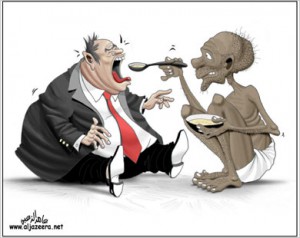Wealth, Poverty and the Mind

Apparently there have been some studies recently into the psychological effects of wealth and poverty on the human mind. Lawrence Davidson of OpEd News writes..
"The notion that the poor can make "free and rational choices" and thus can be held responsible for their situation is incorrect. There is accumulating evidence that poverty literally "messes with your mind" in a way that obstructs responsible choices. In fact, the "free market" contributes to an environment that makes the poor decidedly unfree: confused, preoccupied, and feeling overwhelmed and hopeless. In other words, being poor makes you cognitively dysfunctional.
The latest research to show this was published in August 2013 in the journal Science and is titled "Poverty Impedes Cognitive Function." The gist of the argument is, "Poverty captures attention, triggers intrusive thoughts, and reduces cognitive resources." In other words, the more preoccupied one is with troubles, the less able one is to muster the "cognitive resources" necessary to rationally "guide choice and action." Most people find themselves overwhelmed with problems now and then, but not constantly. What living in poverty does is to hit a person with a toxic cocktail of overwhelming problems day in and day out: financial problems, health problems, parenting issues, victimization by criminals and others, and the problem of just finding and keeping a job."
http://www.opednews.com/articles/The-Mi … 1-764.html
And
Maia Szalavitz of TIME writes
“In a series of experiments, the new study found that lower-class people were better at reading emotions on others’ faces — one measure of what researchers call empathic accuracy — than people in the upper class. “A lot of what we see is a baseline orientation for the lower class to be more empathetic and the upper class to be less [so],” says Michael Kraus, a co-author of the study and a postdoctoral student at the University of California, San Francisco.
Why might that be? “Lower-class environments are much different from upper-class environments,” explains Kraus. “Lower-class individuals have to respond chronically to a number of vulnerabilities and social threats. You really need to depend on others so they will tell you if a social threat or opportunity is coming and that makes you more perceptive of emotions.”
Study co-author Dacher Keltner, a professor of psychology at the University of California, Berkeley, agrees that people in lower socioeconomic classes “live lives defined by threat. They are threatened by the environment, by institutions and by other people. One of most adaptive strategies in response to threat is to be very vigilant and carefully attend to others and try to promote cooperation to build strong alliances.”
An earlier study by the same researchers found that those of lower socioeconomic status were also more helpful and generous, suggesting that it’s not just empathic accuracy but empathy itself that may be enhanced by circumstance. “Coming from an environment where you’re more vulnerable, you solve problems by turning to others,” says Kraus. That increases empathy and strengthens social bonds.”
More often than not those in positions of power who could make substantial strides toward eradicating poverty are wealthy.
“We are living in a period of historically high inequality. Health problems and psychological problems are correlated with inequality and we have rising inequality,” says Keltner. “People in positions of power are not going to see [the inequality]. They’re going to be blind to it and that has enormous implications for how we educate leaders, why they may not see [what's] obvious [to everyone else] and why they may not even understand the suffering of the people below them.”
http://healthland.time.com/2010/11/24/t … s-empathy/
So, if the findings of this research are accurate, what should/ can the poor do? In our modern world where everyone depends heavily on money and the only people who can help the "have nots" are the "haves" who largely don't care, what can be done? Should the poor just accept it? Should they revolt?? What about the rest of us? Should we just see it as a problem for the poor to worry about? Is there hope? What do you think?If poverty truly "messes with the mind" and prevents people from climbing out - why do so many people climb out?
Many people, especially in the United States, climb out of poverty because they want more out of life than to be powerless. Those who wish to leave poverty have a mindset of wanting more. They adamantly refuse to accept their present circumstances as permanent. They simply refuse to succumb to the negativity in their immediate environment whether from peers, family, and/or relatives. They know that being impoverished is not an acceptable lifestyle.
Many people, again especially in the United States, do not climb out of poverty because they have been indoctrinated that they are passive victims of fate. They have been told by family, friends, and other associates that there is nothing THEY can do about being impoverished. They also belong that success and affluent are not for them but for those who weren't born poor. They were further inculcated with the premise that they are insignificant and they have to accept their socioeconomic fate so to speak. Many poor children are told by their parents that education is a waste of time, especially tertiary education. They were told to get jobs, instead of careers. The mindset and psychology of the impoverished are vastly different from that of the middle, upper middle, and upper classes.
In the United States, poor people have a fatalism and passivity regarding their lives. They believe that they are perpetual victims instead of adopting a pro-active approach to their lives. They also expect others to save and rescue them socioeconomically. Well, the only persons who can rescue them is themselves."So many" sounds like a significant majority whereas in reality it is an insignificant minority.
Poverty does mess up the mind and the life.Actually, the best indicator of your income is your parent's income, so not many people are climbing out.
Absolutely, people who have never experienced real poverty cannot comprehend the effect it has on people living under it, it's a constant bane to everything one tries to do that would allow them to get out of poverty.
Want to study? It's hard to study when you are hungry, it's hard to study when the electricity is out, it's hard to study when you don't know where you are going to sleep next week.
Same thing with work etc.There is hard evidence in the UK that if you live in a deprived area you will not be able to even get an interview for a job no matter how suitable you may be.
Just think of that, how ever hard you work, however much you want to move on in the world you are prevented by your post code.So what should be done? What can be done? Just stumbled upon this article yesterday.
http://livefreelivenatural.com/29-incre … exploding/ Things are out of control. Must we ride this wreck into the dirt before we change the way we operate?I don’t know Kathryn L Hill, but I refuse to believe that this is the best humanity can do. How about cooperation over competition, relationships over services, people over profits, perennial permaculture over annual monoculture, abundance over scarcity, sustainability over growth, stewardship over ownership, mutual aid over charity, conservation over consumerism? There are so many ideas floating around.
http://www.new-earth-project.org/
http://www.thevenusproject.com/
http://restorationag.org/2012-pdc/
http://sacred-economics.com/
http://www.deepgreenresistance.org/
http://en.wikipedia.org/wiki/Resource-based_economy
http://en.wikipedia.org/wiki/Direct_democracy
http://opensourceecology.org/
http://www.lietaer.com/2012/07/the-pote … d-lietaer/
http://lammas.org.uk/gallery/
http://timebanks.org/
http://trustcurrency.blogspot.com/2010/ … ircle.html
http://earthship.com/
http://www.complementarycurrency.org/cc … potkin.pdf
This list is just off the top of my head and could go on and on, but these ideas are often shoved to the fringes and dismissed as flights of fancy or Utopian nonsense while people continue to suffer. Our current system obviously doesn’t work for everyone. Shouldn’t it?
Related Discussions
- 9
"Wealth protects the rich; poverty destroys the poor." Proverbs 10:15
by Phanti 10 years ago
"Wealth protects the rich; poverty destroys the poor." Proverbs 10:15What does this verse say to you, do you agree or disagree? Is this relevant in today's society? If so, what can be done about it?
- 36
Middle & Upper Classes Raise THINKERS While Lower Classes Raise SLAVES
by Grace Marguerite Williams 5 years ago
Many studies have been done on how socioeconomic class influences childrearing. These sociological studies indicate that lower, working, & lower middle class parents who are less educated, even uneducated value blind obedience over independent & critical thinking. These parents...
- 51
Are rich people liars, cheats and thieves?
by promisem 7 years ago
In my experience, they are more than they are not. Science backs it up. Your thoughts?https://www.washingtonpost.com/news/spe … 503c1fe516
- 45
What is the root cause of poverty in the world?
by Christian L Perry 7 years ago
What is the root cause of poverty in the world?
- 38
Why middle, upper middle, and upper class children will be more successful in li
by Grace Marguerite Williams 5 years ago
Why middle, upper middle, and upper class children will be more successful in life than children whocome from lower middle to lower socioeconomic backgrounds? It has been substantiated repeatedly that children from socioeconomic affluent backgrounds are the ONES who will be HIGHLY...
- 413
What drives poverty and crime in America?
by janesix 10 years ago
I think it is due to the erosion of families. Mothers no longer stay home with their young children, and fathers are no where to be seen in a large percentage of families. The kids don't have a father figure, and I think this leads to joining gangs, dropping out of school, and criminal behavior. Am...











